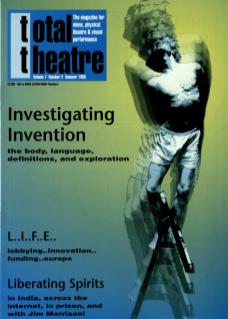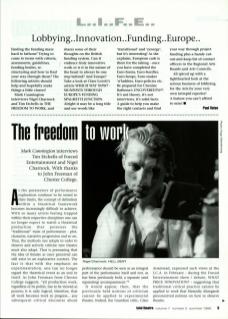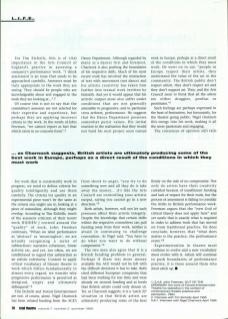As the parameters of performance exploration continue to be tested to their limits, the concept of definition within a theatrical framework becomes increasingly difficult to achieve. With so many artists feeling trapped within their respective disciplines one can no longer expect to watch a theatrical production that possesses the ‘traditional’ traits of performance – plot, character, narrative progression and so on. Thus, the methods one adopts in order to observe and actively criticise new theatre must also adapt. That is presuming that the idea of theatre as once perceived can still exist in an exploratory context. The fact is that with the emphasis on experimentation, one can no longer regard the theatrical event as an end in itself. As John Freeman from Chester College suggests, ‘all production work, regardless of its polish, has to be viewed as process, it is only logical, therefore, that all work becomes work in progress... any subsequent critical discourse about performance should be seen as an integral part of the performance itself and not, as has been previously held, a separate (and separating) accompaniment.’1
It would appear, then, that the previously held notions of criticism cannot be applied to experimental theatre. Indeed, the Guardian critic, Clare Armistead, expressed such views at the ICA in February – during the Forced Entertainment show / debate, What Price Innovation? – suggesting that traditional critical practice cannot be applied to work that blatantly disregards preconceived notions on how to observe theatre.
For Tim Etchells, this is of vital importance in the Arts Council of England's practice in assessing a company's performance work. ‘I think assessment is an issue that needs to be approached carefully. Assessors must be truly appropriate to the work they are seeing. They should be people who are knowledgeable about and engaged in the work they are looking at...’2
Of course this is not to say that the committee's assessors are not selected for their expertise and experience, but perhaps they are applying incorrect criteria to the work. In the words of John Freeman, ‘we cannot report as fact that which exists in no concrete form’.3
For work that is consistently work in progress, we need to define criteria for quality intelligently and use them carefully. The criteria for quality in an experimental piece won't be the same as the criteria one might use in looking at a piece of naturalism, although they might overlap. According to Tim Etchells, much of the assessors’ criticism of their recent work Hidden J centred around the ‘quality’ of work. John Freeman continues, ‘When we label performance as “abstract” or “meaningless”, we are actually recognising a series of subtractions: narrative coherence, linear activity, etc, and yet, too often, we are conditioned to regard this subtraction as an artistic inferiority. Content to apply critical vocabulary of literary theatre to work which differs fundamentally in almost every regard, we wonder why progressive performance is perceived as marginal, empty and ultimately delinquent.’4
...as Charnock suggests, British artists are ultimately producing some of the best work in Europe, perhaps as a direct result of the conditions in which they must work
Tim Etchells and Forced Entertainment are not, of course, alone. Nigel Charnock has been refused funding from the ACE's Dance Department. Although regarded by many as a dancer first and foremost, Charnock is also pushing the boundaries of his respective skills. Much of his most recent work has involved the interaction of text with movement (not dance) and his artistic creativity has taken him further into textual work (written by himself). And yet it would appear that his artistic output must also suffer under conditions that are not generally amenable to progressive, and in particular cross-artform, performance. He suggests that the Dance Department possesses somewhat purist values. His initial reaction to the realisation that they would not fund his next project soon turned from shock to anger, ‘you try to do something new and all they do is take away the money... it's like the Arts Council are controlling your artistic output, saying you cannot go in a new direction’.
Both artists, however, will not let such pressures affect their artistic integrity. Despite the knowledge that certain shifts within the respective committees can pull funding away from their work, neither is afraid in continuing to challenge convention. As Nigel said, ‘You have to do what you want to do without compromise.’6
The two men also agree that it is a British funding problem in general. Perhaps if there was more money available, ACE would not be left with the difficult decisions it has to take. Both cited different European companies that had been working for less time and were already on secured funding and at levels that British artists could only dream of. Yet, as Charnock suggests, it is a 'catch 22’ situation in that British artists are ultimately producing some of the best work in Europe, perhaps as a direct result of the conditions in which they must work. He went on to say, ‘people in Europe respect their artists, they understand the value of the art in the community. The British public don't respect artists, they don't respect art and they don't support art. They, and the Arts Council, seem to think that all the artists are either druggies, pooftas or prostitutes.’
Such feelings are perhaps expressed in the heat of frustration, but, fortunately for the theatre-going public, Nigel channels this energy into his work, making it all the more passionate and engaging.
The consensus of opinion still falls firmly on the side of no compromise. Not only do artists have their creativity curtailed because of insufficient funding and lack of respect for their work, but the process of assessment is failing to consider the shifts in British performance work. Freeman argues that the ‘new God of critical theory does not apply here’ and yet surely that is exactly what is required in order to address work that has moved on from traditional practice. He does conclude, however, that ‘what does matter is the practice, the performance event’.
Experimentation in theatre must continue to evolve and a new vocabulary must evolve with it. Artists will continue to push boundaries of performance practice; it is those around them who must catch up.
1,3,4,8. John Freeman, Out of the Ordinary: The Work of Forced Entertainment Theatre Co-operative in the context of contemporary theatre practice and perception, 1994.
2. Interview with Tim Etchells, April 1995
5,6,7. Interview with Nigel Charnock, April 1995


